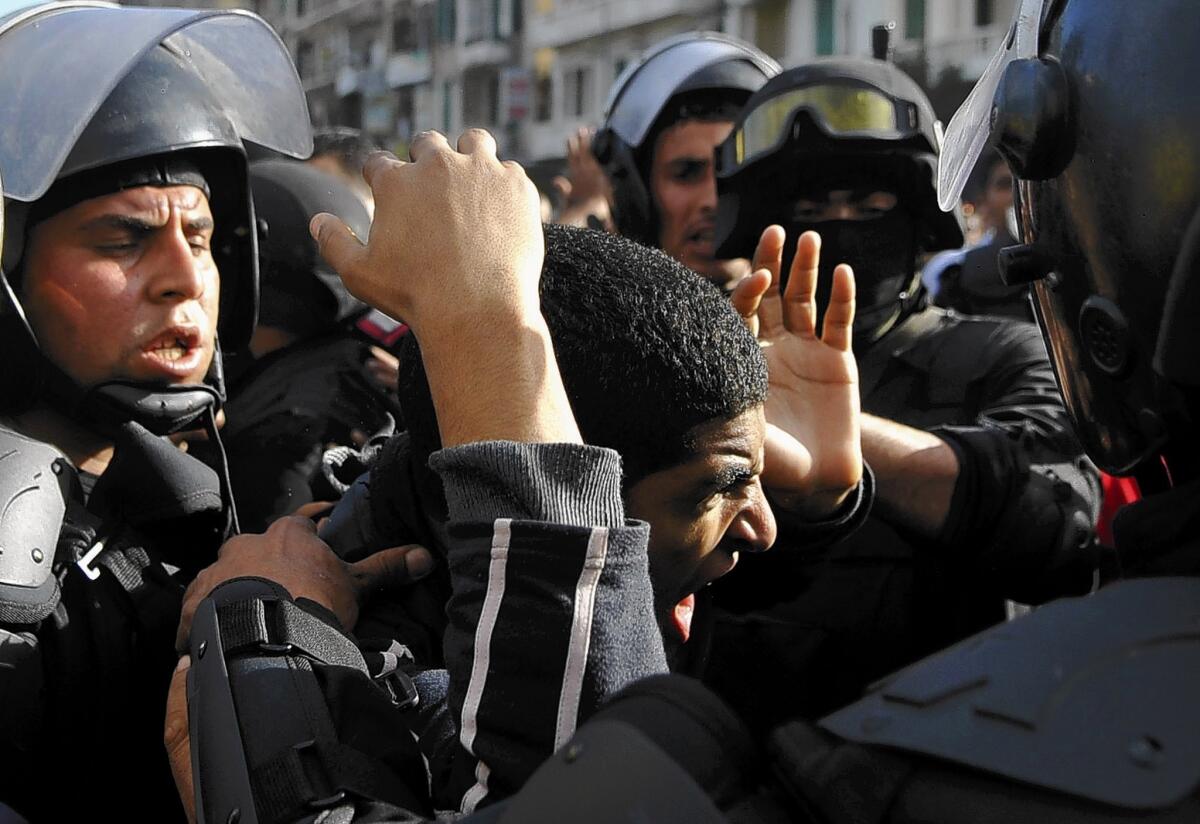Egypt president defends government amid criticism

CAIRO — Even as Egypt came under withering new criticism from international and domestic human rights groups, interim President Adly Mansour on Thursday credited his military-backed government with bringing about “an end to the police state.”
In a backhanded acknowledgment of previous police abuse, Mansour declared that in the wake of Islamist President Mohamed Morsi’s ouster in July, security forces now recognized that their role was defined by laws that they must respect.
That assertion came the same day that London-based Amnesty International issued a report cataloging a broad array of recent rights violations in Egypt and saying that political violence there had killed 1,400 people in the nearly seven months the interim government has been in power. Most of those killed were Morsi supporters.
Morsi’s Muslim Brotherhood movement has been the main target of a sweeping crackdown, but secular figures have also been caught up in a dragnet that appears aimed at silencing government critics. An internationally known Egyptian scholar said Thursday that he had been indicted for espionage, a charge he called preposterous, and a blogger was sentenced Thursday to three months in prison.
Mansour’s remarks came in a speech marking a holiday this weekend honoring the police, who will be on high alert for unrest: This weekend is also the anniversary of the 2011 Tahrir Square protests that eventually toppled autocrat Hosni Mubarak.
The president said a subsequent uprising — mass protests early last summer that spurred the army to remove Morsi from office — “turned a new page in the relationship between the people and the police … putting an end to the police state and protecting the dignity of the citizen.”
At the same time, Mansour described police as heroes in the struggle against terrorism, citing attacks such as one earlier Thursday in which five officers were killed in a shooting at a checkpoint south of Cairo. There was no immediate claim of responsibility, but the government generally blames Islamic militants for strikes against security forces.
Activists have said officials use such attacks as a pretext for moving against anyone expressing opposition to the government, whether they are supporters of the Muslim Brotherhood or avowed secularists. Amnesty International, in its report, argued that the security forces, the courts and other elements of the state apparatus had been systematically used by the interim government as tools of repression.
“Egypt has witnessed a series of damaging blows to human rights and state violence on an unprecedented scale over the last seven months,” said Hassiba Hadj Sahraoui, the group’s Middle East and North Africa deputy director.
Deputy Foreign Minister Hisham Badr sharply disputed the report’s conclusions and urged Egyptians to disregard “attempts to distort the facts.”
The government was also singled out for criticism on Thursday by Freedom House, a U.S.-based pro-democracy watchdog group. In its annual report on the state of freedom worldwide, the organization cited the coup against Morsi as having led to “across-the-board reversals in [Egypt’s] democratic institutions.”
The Egyptian academic accused of espionage is Emad Shahin, a scholar of political Islam. In an open letter to friends and colleagues, he said the charges were “far-fetched” and politically motivated.
“Though I have always been a fervent critic of authoritarian rule in Egypt, I have always expressed strong support for peaceful protests to restore democracy and express popular opposition against government repression,” Shahin, who was traveling in the United States, wrote in his open letter.
Shahin is named as a codefendant in a case against Morsi and more than 30 other defendants who are accused of colluding with foreign militant groups such as Hamas and Hezbollah. Morsi faces four trials on various charges, several of which carry the death penalty.
The blogger sentenced to prison, Ahmed Anwar, had been arrested after posting a satirical video on YouTube. The verdict drew criticism from two Egyptian rights groups, which said the case showed the government refused to tolerate criticism of any kind.
More to Read
Start your day right
Sign up for Essential California for news, features and recommendations from the L.A. Times and beyond in your inbox six days a week.
You may occasionally receive promotional content from the Los Angeles Times.






